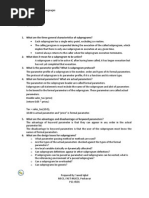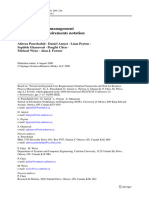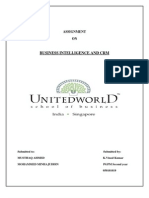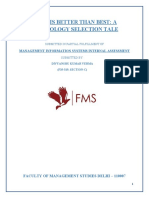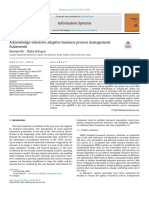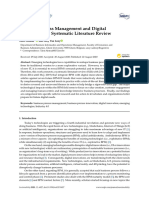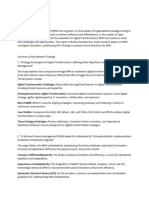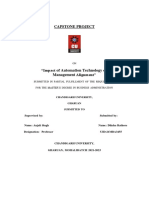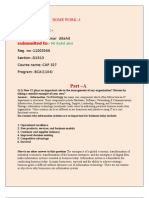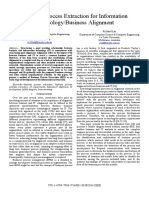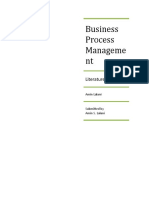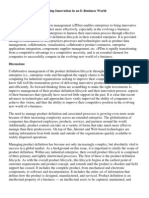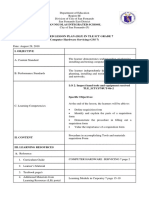Bai So 2
Bai So 2
Uploaded by
Tieu Yen TuCopyright:
Available Formats
Bai So 2
Bai So 2
Uploaded by
Tieu Yen TuOriginal Title
Copyright
Available Formats
Share this document
Did you find this document useful?
Is this content inappropriate?
Copyright:
Available Formats
Bai So 2
Bai So 2
Uploaded by
Tieu Yen TuCopyright:
Available Formats
Proceedings of the International Conference on Industrial Engineering and Operations Management
Dubai, UAE, March 10-12, 2020
The Role of Process Management in the Context of
Industry 4.0
Michal Svehla, Tomas Rericha, Jiri Tupa, Frantisek Steiner
Department of Technologies and Measurement
University of West Bohemia in Pilsen
University 8, Czech Republic
svehlam@rice.zcu.cz, trericha@ket.zcu.cz, tupa@ket.zcu.cz, steiner@ket.zcu.cz
Abstract
Process Management or Business Process Management (BPM) ideas published in a book Hammer’s Business Process
Reengineering Concept, are implemented in many businesses nowadays. Process management helps companies
achieve quality, time, and cost goals. In quality management systems, the concept of process management is the core
integrates into the performance and risk management system. On the other hand, an interesting research question is
what is the role of process management in the context of the 4th industrial revolution and smart factories. The number
of solutions for automated processes in the smart factories will be increasing, and due to this fact, traditional
management tools and techniques should be revised. Business process management is one of them. Based on this fact,
we have tried to answer the research question — What is the role of BPM for Industry 4.0? — in this paper. This
research question deals in this article, which focuses attention on selected aspects of BPM within the Industry 4.0
concept. The paper also attempts to mention the impacts and needs of current technical education in this area.
Keywords
Business Process Management, Industry 4.0, Engineering Education, Quality Management
1. Introduction and motivation
Industry 4.0 is nowadays a topic of research and interest for many universities, research institutes, and businesses.
Research focuses on how this concept is implemented in practice. It requires, in particular, the transition to the
digitization of business processes and their ICT support. In particular, the use of cyber-physical systems, which allow
to simulate reality and implement digital twins for virtual machine control, including robots and processes, is
discussed.
One of the prerequisites for the successful implementation of this management concept is the understanding of
processes in the company and the description of process models. Experience shows that these process models could
be used to implement information systems to support the management of all business activities, from operations
management to supply chain management. In the past, many businesses have also focused on supporting the
implementation of process management as a way to help them achieve their goals in terms of quality, cost, and time.
The concept of business process management has been adopted for quality management standards. Due to this reason,
many companies implemented this concept for their management.
Based on the mentioned facts, the research question has been formulated. The core research question is What is the
role of business process management (BPM) for Industry 4.0? This paper deals with an answer to the formulated
research question.
© IEOM Society International
2677
Proceedings of the International Conference on Industrial Engineering and Operations Management
Dubai, UAE, March 10-12, 2020
2. State of the art
2.1 Industry 4.0
The Industry 4.0 concept has been known for a long time. The basic idea is to create “Smart Factories” that will use
cyber-physical systems. They will take over the repetitive activities that have been performed by humans until then.
The big problem of the implementation of Industry 4.0 is digitization and integration (digitization and integration of
any simple production-trade relationship up to digitization and integration of complex interconnected production-trade
chains).
Companies, therefore, have to face this difficult challenge. How to best perform digital transformation? How to
implement technologies that are adaptable and simultaneously as flexible and agile as possible for your organization?
From this perspective, the use of Business Process Management (BPM) is more than appropriate and will help
effectively respond to challenges and requirements.
2.2 Business process management nowadays
Process management is an essential part of management. Process management must be following the stated strategic
goals of the organization, design, implementation of process architecture, and defined metrics. It needs to be aligned
with organizational goals and management training so that they can effectively manage these processes.
In today’s world, companies of all sizes and types confront with high competition. To remain competitive, improve
their results, adapt to the market use Business Process Management (BPM), to improve processes. So we can say that
Business Process Management is a systematic approach to mapping, analyzing, and improving processes.
With the adoption of the fourth industrial revolution and its Digital transformation, society must adapt to changing
technologies. Here we can again see the benefits of BPM. In the short term, BPM helps organizations reduce costs
and increase efficiency. It can mean higher revenue and growth for this organization. In the long term, BPM helps to
create a competitive advantage by improving organizational agility. Using BPM can help increase the efficiency,
agility, and success of any organization in the private and public sectors.
2.3 Benefits of BPM
It is crucial to realize that BPM is a combination of practices and methods that focus primarily on increasing the value
of a company by improving its processes. It can be simple (e.g., defining poorly described processes, making changes,
finding possible improvements) or significantly more complex (such as complex reengineering of business processes).
We can mention that using BPM brings many benefits to businesses (Ubaid and Dweri, 2020). This section discusses
some of the significant benefits, that can expect with BPM:
A) Agility
One of the critical features of BPM is that it facilitates the design of processes. The proposed processes are flexible.
BPM supports flexibility in making process changes at a minimal cost. Processes can be easily customized to meet an
organization’s requirements. Very often, organizations confront the need for change. Changes may become necessary
as a result of new regulations, market requirements, or new ways of working. People and organizations need smarter
yet faster decision-making. Problems need to be resolved faster, and communication needs to be more productive.
B) Productivity
BPM supports the automation of repetitive elements and regular procedures. It is possible to eliminate bottlenecks
with the introduction of parallel processing and with the removal of unnecessary steps. Thanks to its employees can
spend more time on core activities and does not have to deal with support functions (processes). It also increases
productivity. It focuses primarily on achieving goals by improving management, control, analysis, and modeling tools.
By investing in new tools it helps companies increase productivity. It is necessary to identify technologies that provide
increased production efficiency and integrate them into business and infrastructure.
C) Efficiency
With BPM support, is better visibility and transparency of business processes. It is, therefore, possible to focus on
inefficiency. We increase efficiency and, with these, save our resources. At the end are better designed, optimized,
and monitored processes. The main focus is on process automation (automating repetitive low-value processes), IT
© IEOM Society International
2678
Proceedings of the International Conference on Industrial Engineering and Operations Management
Dubai, UAE, March 10-12, 2020
outsourcing (significantly improving the quality of IT services and reducing its costs), setting achievable goals (setting
motivating goals based on real analysis).
D) Compliance & Transparency
Organizations need to be compliant with industry, government regulations, and directives. BPM supports the rapid
implementation of these requirements, helping to avoid potential delays and thus avoid possible sanctions and
penalties. Organizational processes are transparent, visible, and fully accessible for employees.
E) Customer Focus
Thanks to optimized processes and higher productivity, we can better focus on the customer. We can better respond
to his proposals, create solutions faster, and adapt to them. Customers determine the success or failure of our company.
If we ignore them, someone else will come who will not ignore them.
F) Measurability
All processes are measurable and can be compared with results at any time. BPM provides reporting and analysis
tools. Processes can be quantified, optimized, and used as support for effective decision making. Types of process
performance metrics (efficiency, effectiveness, capacity, productivity, quality, profitability, competitiveness, value
indicators)
G) Technology Integration
BPM tries to bridge the communication gap between user and IT support. The main effort is to use standards (e.g.,
BPMN). This is especially important when implementing Industry 4.0.
BPM is not software; it is a way of working. In its concept, it enables companies to be proactive and agile. The
processes are better visibility and transparency and can be optimized. Activities are organized in individual processes
and can be managed very well from a strategic, organizational, and technological point of view Škrinjar and Trkman
(2013). Everything can be integrated into the technology chain to achieve Digital Transformation 4.0.
2.3 Industry 4.0 in relation to BPM
With the upcoming evolution in the industry, it is necessary to assess what BPM technologies adapted or improved to
be suitable for application in Industry 4.0. The paper (Sishi and Telkukdarie, 2017) presents the context with Industry
4.0 and BPM. The other papers connected to this problem.
The paper (Petrasch and Hentschke, 2016) proposes for suppliers and manufacturers to use a advantage of new
technological concepts, e.g., Cyber-Physical Systems (CPS), Internet of Things, and Cloud Computing (CC). This can
bring the possibility of creating new products and services to reduce costs and increase productivity. Industry 4.0 is
comprised of three basic parts Embedded Systems (ES) / Cyber-Physical System (CPS), Internet / Cloud of Things
(IoT / CoT), and Service-Oriented Architecture (SOA) / Internet of Services (IoS) / Cloud Computing (CC). Progress
in the development of some of these systems has brought them into the current world. Smart Factory or Smart
Manufacturing is not just a term but gradually becomes a reality.
To fully implement them, some aspects are not covered, such as standardization, specification, and modeling
languages. This paper (Roseman and Brocke, 2015) deals with a modeling language, especially for Industry 4.0, in
short, “I4PML”. Also, a method for the specification of Industry 4.0 application using “I4PML” and “UML” is
described in this article. Paper results are that user’s needs and business goals are considered as a first step. Before
any technological investments are made in hardware or software, the focus goes to the concept for an industry 4.0
application. Concept specifications should include the description and model of business processes and data structures.
As Industry 4.0 is currently in the early stage of development, there are aspects like security, usability, availability,
reliability that needs to be considered when using for application in Industry 4.0. Devices and services play a crucial
role in the business process, so their specifications must be present.
Other paper (Bocciarelli et al., 2017) is focused on A BPMN extension for modeling Cyber-Physical-Production-
Systems in the context of Industry 4.0. The paper presents an approach how to specify and manage resources
associated with the business process, which supports Cyber-Physical Production System. Paper also contains a
proposal of notation to define actual entities in the design stage, which performs the process activities and their non-
functional properties. This notation extends a current Business Process Modeling Notation (BPMN), and because of
© IEOM Society International
2679
Proceedings of the International Conference on Industrial Engineering and Operations Management
Dubai, UAE, March 10-12, 2020
that analysis can be executed on simulation of the Cyber-Physical Production System. An analysis is focused on
reconfigurability, adaptability, and reliability of the Cyber-Physical Production System. Model-Driven Architecture
(MDA) principles and standards are exploited to propose this notation. Because of this, they are exploiting
considerable advantages such as easy customization and improved automation are obtained. In the end, there is an
application example where the business process supports the execution of the Cyber-Physical Production System. The
result of this work is an approach in metamodeling for the characterization of Cyber-Physical System resources in
Industry 4.0 business process. BPMN metamodel extension is presented and used for managing resources involved in
the business process, which is executed by the Cyber-Physical Systems. This system can be assembled with different
components such as sensors, actuators, communication interfaces, control units, and other more. The aim of the
proposed approach is to provide support to model complex structures. Analysis of model focuses performance and
reliability of the business process at a design stage, and then an evaluation is performed considering the impact of
every component in the structure.
The paper (Rehse et al., 2018) deals with an application case in the DFKI Smart Lego Factory. Paper is presenting an
application case in model of Smart Factory build from Lego parts. Because of this model, there is an illustration of
how can established techniques from Business Process Management (BPM) can provide answers to a new challenge
rising with Industry 4.0. DFKI Smart Lego Factory is a fully automated “smart factory” build-out of LEGO® bricks.
Demonstration of the potential of business process management methodology in Industry 4.0 is shown in three
application cases which are proposed in this work. Application cases are following model-based management, process
mining, and prediction of the manufacturing process in smart factories. Challenges that arise from presented specific
application cases are conquered with business process management. The result of this work shows that suitable
business process methods can address those challenges. DFKI-Smart-Lego-Factory can cover many real-life
challenges and serves as a learning tool on how to better implement future concepts and projects. Potential of DFKI-
Smart-Lego-Factory is far more significant, and presented application cases do not exhaust the field which Industry
4.0 provides.
Problems on Blockchain-based business process management (BPM) framework for service composition in Industry
4.0 present paper (Viriyasitavat at al., 2018). The authors mention that Business process management (BPM) is a tool
to optimize business processes to reach a better performance of a system, for example, higher profit, quicker response,
and better services. Industry 4.0 gives a requirement for a business process management systems to digitize and
automate business process workflows and make interoperations of service vendors more transparent. BPM systems
have a bottleneck in evaluation, verification, and transformation of trustworthiness and digitized assets. Blockchain
technology is explored as a service in an open business environment, which should serve as an automated BPM
solution. There is a proposal to transfer and verify the trustiness of business and partners by Blockchain technology.
The paper contains an illustration of developed BPM framework how Blockchain technology can be integrated to
provide many benefits when evaluating and transferring Quality of Services in the workflow composition and
management. The result of this work expects an automatization of service selection and composition by BPM systems
in Industry 4.0 to have more transparent interoperations of dynamic organizations.
In the current state, there is still a need for third-party certificates as an essential part of selecting and composing
services for business projects. This need leads to a number of issues with BPM systems. Scalability is a barrier for the
growing population of available services. Another one is the potential of transformation loopholes. When verification
trustworthiness, a time delay can occur, which can be the next issue. The last issue mentioned in this paper rises in
openness and security concerns. The biggest issue solved in this paper is to effectively solve the trustworthiness issue
in the open business environment with Blockchain Technology. This work gives an in-depth look at Blockchain
technology as an ideal candidate to replace third-party authorities. From this, a Blockchain technology-based approach
is developed.
The paper (Hitpass et al., 2019) focuses on challenges rising from Industry 4.0 together with digitalization where
business process management can be used as a systematic approach to identify, map, document, design, implement,
measure, and control business processes. This gives more emphasis on IT systems as a support to improve, innovate,
and manage processes. Every phase of product or service marketing, purchase, sale, and distribution through the
internet will be backed by E-Commerce. With Industry 4.0, every logistic aspect will be digitized (e.g., purchase, sales
processes), and business process and e-commerce need to be managed together, not separately. With revolution in the
industry (Industry 4.0) we are experiencing a shift of paradigm from centralized to decentralized paradigm, which
results in a big impact on the relation between BPM and e-Commerce.
© IEOM Society International
2680
Proceedings of the International Conference on Industrial Engineering and Operations Management
Dubai, UAE, March 10-12, 2020
There will be far more transparency from traceability and monitoring in production and logistic systems, more
autonomy in the value chain links management, intelligence in activities or devices responsible for decision making
and integration of all the payment services and business transactions and integration involving external agents that
interact in the value chain. This overview of challenges establishes Industry 4.0 as a leader to a new kind of business
processes and e-commerce. The trend is shown by decentralizing processes with more significant decision making
autonomy, real-time control of the automated organizational processes, improved performance and quality of
environment-integrated logistic organizational processes, and e-Commerce integration at each point as transaction
enabler.
3. Implementation of Industry 4.0
It is important to realize that 4.0 implementation in industrial enterprises can not be done abruptly, but rather it is a
gradual change. If we focus on the implementation of Industry 4.0 to the small and medium-sized enterprises, it is
necessary to make this change in the several phases (Benesova and Tupa, 2017):
● Process analysis
● Data collection
● Horizontal integration and vertical integration
● Self-controlling system.
The related research question is “How principles of business process management can be applied in each
implementation phase? The research results based on literature review is presenting in the next part in relation to each
steps. The implementation of the BPM is described based on implementation of a Deming PDCA cycle (Plan-Do-
Check-Act). This concept enables to achieve the requirements for process management system. Figure 1 presents
activities for implementing each phase of PDCA.
Figure 1 PDCA model
3.1 Process analysis
Process analysis is an initiative step. A company, as a first thing, need to map all the processes which are in the
company and then transform them into a digital form that can transform every aspect of production. When the company
needs to regulate or correct the process (e.g. production line), you have a digital copy of that process and adjust that
almost immediately because machines will react instantly. Also, data from those processes can be evaluated in real-
time. The process design and models are the result of this step.
New technologies of Industry 4.0 brings an important role in process design and process modeling. The new role is
related with process digitalization. The term of digitalization of processes is related to smart factories or digital supply
chain network. In the context of process management, digital transformation refers to transforming the business
operations, services, and models. Digital transformation covers all processes in the companies, and the aim is to build
a digital model of enterprise with the digitized process attributes (input, output, sources, and indicators). The
companies should determine rules, methods, and standards for process analysis, modeling and digitalization. The aim
of this step is a digital model of enterprise. The models can be deterministic, stochastic, uncertain but structured, or
uncertain but imperfectly structured. Modelling tools can be categorised into business process chain-based type such
© IEOM Society International
2681
Proceedings of the International Conference on Industrial Engineering and Operations Management
Dubai, UAE, March 10-12, 2020
as Petri net, IDEFO, IDEF3, BPMN 2.0, ARIS-eEPC, etc.; formal description type such as WPDL, XML, process
algebra, predicative logic, etc.; and object-oriented type such as IDEF4 and UML. The overall model is analysed on
the individual models. Models would have to contain all process attributes and static and dynamic parameters such as
process time, process threats, cost, etc.
This model should contain:
● Relationship between the cyber and physical layer.
● Description of the main processes (processes that create added value).
● Definition of support processes and autonomous control processes.
3.2 Data collection
Data collection is a vital part of industry 4.0 because there is a need to evaluate if a process is functioning correctly,
and without feedback, there is no possibility to decide that. Data can be transmitted from PLCs, sensors; basically,
from every part of a system, we can gather relevant data. Those data needs to be stored in a safe location and with
industry 4.0, and for better accessibility, data are stored in the cloud and then send to certain IoT software. From this,
a digital model of a factory or company can be made.
The data can be used for process monitoring. The main principles of the process monitoring system are described by
many authors, and a lot of them discuss phrase process performance measurement. Process performance measurement
is the combination of process, methodologies, metrics, and technologies to measure, monitor, and manage the
performance of the process.
The implementation of IoT or Internet of Services, Process, and People (Internet of Everything) and related
technologies help to implement a system for automated and real-time process monitoring. These technologies help to
display the state of processes. The automated system of measurement enables storage data into a data warehouse, and
we are speaking about the analysis of Big Data. Big Data analytics is the process of examining large and varied data
to uncover hidden patterns, unknown correlations, market trends, customer preferences, and other useful information
that can help organizations make more-informed business decisions.
Data can be used for:
● Process mining for automated weak point analysis.
● Right time monitoring.
● Dynamic organizational analysis.
● Process simulation.
3.3 Horizontal and vertical integration
Horizontal integration is happening inside of a company, and the best example is to integrate systems in factories and
automate machines needed for manufacturing. It is possible to have an overview of the consumption of inputs in
processes and other data concerning manufacturing. Because of this overview, it is possible to compare planned data
to real data from the system and also compare a state of supplies. This allows a quick reaction either for a responsible
person or a system to evaluate that supplies are getting low, and they need to be restocked. Or another point of view
is that the company will be more flexible to customer needs because of digitalization and machine automation.
Vertical integration is another phase of implementing an industry 4.0. This phase is about a data evaluation and
processing and automatization of vertical processes. Data gathered can contribute to better production management,
which is one of many vertical processes that need to be automated. So the systems as a modular management system,
manufacturing execution system, and enterprise resource planning system can establish business process execution.
The business process execution means that instances of a process are performed or enacted, which may include
automated aspects. Automation of business processes is based on using Business Process Execution Language
(BPEL). BPEL language is perfectly suited to a clear description of the processes by which processes can be then
mechanically exercised. BPEL enables organizations to automate their processes (so-called service orchestration).
BPEL language allows the description of the conduct and behavior of business processes as a sequence of activities,
including their branches, which are engaged in the process, while these activities are represented by web services
(WS).
© IEOM Society International
2682
Proceedings of the International Conference on Industrial Engineering and Operations Management
Dubai, UAE, March 10-12, 2020
The business process execution in terms of Industry 4.0 is related to the digital factory and application of the Cyber-
Physical System (CPS). The rules and process model can be used for the definition of elementary relationships in
CPS. The cyber level of CPS enables simulation of the process with using digital twins and makes an environment for
processes execution.
The CPS implements these elements:
● Data acquisition and data processing.
● Machine to Machine communication.
● Human-machinene interaction.
3.4 Self-controlling system
The result of data collection and integrations is a self-controlling system. This system is almost autonomous with an
overview of a responsible person (e.g., operator, maintenance worker) if any situation occurs, then he needs to correct
it. The self-controlling system produces maximal productivity because the system can optimize itself. Benefits that
can this implementation brings are more visible and optimized decision making, better planning methods, data
analysis, remote monitoring, automation, proactive maintenance, and more significant agility. This is also related to
the issue of business process improvement.
Process improvement is an important phase of business process management. The aim is the continual improvement
of the business process based on monitoring and data collection. Especially in the context of digital processes, the
identification of existing pain points can be realized through the performance of continuous software tests. The other
definition explains process improvement is the proactive task of identifying, analyzing, and improving upon existing
business processes within an organization for optimization, and to meet new quotas or standards of quality. The
companies collect data not only from manufacturing processes but from all processes during the product life cycle.
The companies use several methodologies like Six Sigma, and Centric leverages DMAIC (Define, Measure, Analyze,
Improve, Control), Lean principles etc. New possibilities of technologies of Industry 4.0 can effectively support the
implementation of the mentioned methodologies. The selection of a continuous improvement methodologies depends
on the overall strategy.
3.5 Summary
Table 1 is summarizing the role of business process management for the implementation phase of concept Industry
4.0. It is evident that the essential theoretical and practical background may be applied.
Table 1. Role of BPM
Implementation phase of concept Industry 4.0 Role of Business Process Management
Process analysis Process design and modeling
Data collection Process monitoring
Horizontal integration and vertical integration Process execution
Self-controlling system. Process improvement
For a successful implementation of the Industry 4.0 concept, it is necessary to create an implementation team with the
appropriate competence and knowledge. The implementation team should include a process analyst or methodologist
with the following knowledge (Benesova and Tupa, 2017):
- Project management
- Engineering and technology management
- Innovation management
- Risk and ICT management
- Business process management
- Soft skills – communication, creativity
4. Conclusion
The aim of this theoretical conference paper is to focus on the elements of a Business Process Management for
implementation of the concept Industry 4.0. The concept Industry 4.0 and its technologies open new challenges for
BPM implementation nowadays. The technologies based on CPS, IoT, Digital Factory, etc. help to improved processes
© IEOM Society International
2683
Proceedings of the International Conference on Industrial Engineering and Operations Management
Dubai, UAE, March 10-12, 2020
based on useful process measurement, simulation, and application of predictive models. The identification of role
BPM in each implementation phase of Industry 4.0 has described in the previous chapter, and the chapter answered
the research question: What is the role of business process management (BPM) for Industry 4.0? We conclude that
Business Process Management is a relevant discipline nowadays, and with the concept Industry 4.0, the new challenges
for its successful implementation are opened. The successful implementation of process management also plays an
important role in application an integrated quality, safety and information security management system according to
international ISO standards.
Acknowledgments
This research has been supported by the Technology Agency of the Czech Republic, project No. TH02010577
“Software platform for Implementation Accelerating of Process Control and Automation Systems” and by the Student
Grant Agency of the University of West Bohemia in Pilsen, grant No. SGS-2018-016 “Diagnostics and Materials in
Electrical Engineering”.
References
Ubaid, A.M., Dweiri, F.T., Business process management (BPM): terminologies and methodologies unified,
International Journal of System Assurance Engineering and Management, 2020.
Rosemann M, Brocke JV., Handbook on business process management 1: introduction, methods, and information
systems, Springer, Berlin, 2015.
Škrinjar R, Trkman P., Increasing process orientation with business process management: critical practices.
International Journal of Information Management 33(1), 48–60, 2013.
M. N. Sishi and A. Telukdarie., Implementation of industry 4.0 technologies in the mining industry: A case study,
IEEE International Conference on Industrial Engineering and Engineering Management (IEEM), 201-205,
2017.
Rehse, Jana-Rebecca and Dadashnia, Sharam and Fettke, Peter., Business process management for Industry 4.0 –
Three application cases in the DFKI-Smart-Lego-Factory, it - Information Technology. 60. 133-141. 07/2018.
R. Petrasch and R. Hentschke., Process modeling for industry 4.0 applications: Towards an industry 4.0 process
modeling language and method, 2016 13th International Joint Conference on Computer Science and
Software Engineering (JCSSE), 1-5, 07/2016.
P. Bocciarelli and A. D’Ambrogio and A. Giglio and E. Paglia., A BPMN extension for modeling Cyber-Physical-
Production-Systems in the context of Industry 4.0, 2017 IEEE 14th International Conference on Networking,
Sensing and Control (ICNSC), 599-604, 05/2017.
Viriyasitavat, Wattana and Xu, Li and Bi, Z. and Sapsomboon, Assadaporn., Blockchain-based business process
management (BPM) framework for service composition in industry 4.0, Journal of Intelligent
Manufacturing, 05/2018.
Hitpass, Bernhard AND Astudillo, Hernán., Editorial: Industry 4.0 Challenges for Business Process Management
and Electronic-Commerce, Journal of theoretical and applied electronic commerce research, 14. I-III, 2019.
Andrea Benesová and Jiri Tupa., Requirements for Education and Qualification of People in Industry 4.0. Procedia
Manufacturing, 11. 2195-2202. 2017.
Biographies
Michal Svehla is a vice president of the University of West Bohemia IEOM chapter. He is also a student of the
doctoral study program at the faculty of Electrical Engineering University of West Bohemia in Pilsen. Before doctoral
study, he earned Bachelor’s and Master degree in the same University as mentioned above. His research interests
include e-Health/healthcare, processes, optimization.
Jiri Tupa received his MSc (2002) and Ph.D. (2006) in Electrical Engineering from Faculty of Electrical Engineering,
University of West Bohemia in Pilsen in Czech Republic. He is a Vice-dean of faculty and Senior Lecturer at the
Department of Technologies and Measurement. Dr. Tupa is a member of executive management at Regional
Innovation Centre for Electrical Engineering of the Faculty of Electrical Engineering at the University of West
Bohemia in Pilsen. He is also PhD supervisor, reviewer of journal and conference publications and co-organizer of
conferences. His research interests include Business Process Management, Quality Management, Risk and
Performance Management in Electrical Engineering Industry, Industrial Engineering, Electronics Manufacturing and
Diagnostics, Financial and Project Management, Copyrights and patents law, information law and transfer of IPR. Jiri
Tupa is responsible for several international research and development projects with industrial and University partners.
© IEOM Society International
2684
Proceedings of the International Conference on Industrial Engineering and Operations Management
Dubai, UAE, March 10-12, 2020
The project RiMaCon - Risk Management Software System for SMEs in the Construction Industry is one of the
important international projects. This project has received funding from the European Union’s Seventh Framework
Program for research; technological development and demonstration (2013-2017). The RiMaCon project’s main goal
is to implement a collaborative effort to promote the sharing of knowledge and competencies in a long-term strategic
research partnership around the development, testing, and validation of a cost-effective and user-friendly risk
management system for SMEs in the construction sector.
Frantisek Steiner was born in Rokycany in 1973. He was awarded an Ing. (MSc) degree in the field of Applied
Electronics in 1996, a Ph.D. degree in the field of Electronics in 2001 and an Associate Professorship in Electrical
Engineering in 2008. He is an Associate Professor at the Faculty of Electrical Engineering of the University of West
Bohemia. He is the head of the Diagnostics and Testing Engineering Team at The Regional Innovation Centre for
Electrical Engineering (RICE). His research fields include risk management, information security management
systems and IT services management. He has published more than 120 papers and presented 45 contributions in
35 congresses.
Tomas Rericha is a member of the Department of Technologies and Measurement at the University of West Bohemia
in Pilsen. He received his Ph.D. degree in 2007. He focused on the optimization and simulation of industrial processes
and the implementation of lean manufacturing in production companies. He is currently working as secretary of the
Department of Technology and Measurement.
© IEOM Society International
2685
You might also like
- Contemporary Management IssuesDocument6 pagesContemporary Management IssuesRedemptah Mutheu MutuaNo ratings yet
- Trends in Business Process ManagementDocument15 pagesTrends in Business Process ManagementStudie Vereniging VRiSBI100% (7)
- Business Process Management (BPM)Document14 pagesBusiness Process Management (BPM)zmrman50% (2)
- EasyIO Lab Test 01 - FG Series v1.2Document60 pagesEasyIO Lab Test 01 - FG Series v1.2john smithNo ratings yet
- Crack Propagation Methods in LS DYNADocument24 pagesCrack Propagation Methods in LS DYNAm085No ratings yet
- Capstone Project Guidelines 2012Document36 pagesCapstone Project Guidelines 2012Dennis Ray G DumaguinNo ratings yet
- Chapter 9 & Chapter 10 SolutionsDocument7 pagesChapter 9 & Chapter 10 SolutionsSaeed IqbalNo ratings yet
- MCOSMOS Rack Alignment v3.2 - ACR3, FCR25 and SCR200 Jul11Document17 pagesMCOSMOS Rack Alignment v3.2 - ACR3, FCR25 and SCR200 Jul11sensacje100% (2)
- Management Information SystemDocument33 pagesManagement Information SystemSaimun hossainNo ratings yet
- 119 - Tamarine Gendhis Dewi K - SG5 - (Bussines Process)Document3 pages119 - Tamarine Gendhis Dewi K - SG5 - (Bussines Process)TAMARINE GENDHIS DEWI KINARI 5010201119No ratings yet
- Business Process Management 1Document8 pagesBusiness Process Management 1Omar Ahmed ElkhalilNo ratings yet
- Business Process Management With The User Requirements NotationDocument48 pagesBusiness Process Management With The User Requirements Notationleobardo.ameerNo ratings yet
- Business Intelligence and CRM: Assignment ONDocument15 pagesBusiness Intelligence and CRM: Assignment ONVinod KumarNo ratings yet
- 6b-Digital Business & New Technologies - Copy-5 CorrectedDocument17 pages6b-Digital Business & New Technologies - Copy-5 CorrectedRahul Sarkar100% (1)
- Good Is Better Than Best: A Technology Selection Tale: Management Information Systems Internal AssessmentDocument6 pagesGood Is Better Than Best: A Technology Selection Tale: Management Information Systems Internal AssessmentDivyanshuNo ratings yet
- Information Systems: Huseyin Kir, Nadia ErdoganDocument16 pagesInformation Systems: Huseyin Kir, Nadia ErdoganGiannina Costa LizamaNo ratings yet
- Topics For KalpathaDocument11 pagesTopics For KalpathaShanthi UnnithanNo ratings yet
- 1st BPM GenDocument3 pages1st BPM Gensachintharathnayaka12No ratings yet
- Business Process Analysis and Optimization - A Pragmatic Approach To Business OperationsDocument36 pagesBusiness Process Analysis and Optimization - A Pragmatic Approach To Business OperationsParvez Alam100% (1)
- How To Develop Standardized Work For Business Processes in The Transactional Office EnvironmentDocument16 pagesHow To Develop Standardized Work For Business Processes in The Transactional Office Environmentpatriziocerna12No ratings yet
- Accenture BPM High Performance Through Process ExcellenceDocument8 pagesAccenture BPM High Performance Through Process ExcellenceKheven Lee100% (1)
- Are 550 - TPDocument10 pagesAre 550 - TPKhalid JunaidNo ratings yet
- Sustainability 12 06827 v2Document29 pagesSustainability 12 06827 v2Satya KarNo ratings yet
- Operations Management Technology PresentationDocument8 pagesOperations Management Technology Presentationapi-238986744No ratings yet
- Example RFP Development GuideDocument17 pagesExample RFP Development Guidelaconically100% (1)
- NotesDocument16 pagesNotesRosalia KatangaNo ratings yet
- IntroductionDocument5 pagesIntroductionsachintharathnayaka12No ratings yet
- Best Practice in Leveraging E-Business Technologies To Achieve Business AgilityDocument21 pagesBest Practice in Leveraging E-Business Technologies To Achieve Business AgilityDandy RamdaniNo ratings yet
- Bradford University School of Management PT MBA 2010/2012 Operations ManagementDocument14 pagesBradford University School of Management PT MBA 2010/2012 Operations ManagementNeilan MylvaganamNo ratings yet
- A Better Call Guide, But Not MineDocument20 pagesA Better Call Guide, But Not MinelaconicallyNo ratings yet
- The DocumentDocument7 pagesThe Documentsachintharathnayaka12No ratings yet
- Management Information System ofDocument22 pagesManagement Information System ofJasMeetEdenNo ratings yet
- Diksha Rathore 21MBA3455 CP No. 1Document15 pagesDiksha Rathore 21MBA3455 CP No. 1Imran KhanNo ratings yet
- How To Exploit The Digitalization Potential of Business ProcessesDocument29 pagesHow To Exploit The Digitalization Potential of Business ProcessesAdaikalam Alexander RayappaNo ratings yet
- Transformation of Business Processes in The ConditDocument6 pagesTransformation of Business Processes in The ConditVenkatesh PerumalNo ratings yet
- Business Process ModellingDocument8 pagesBusiness Process ModellingMARTIN MAINGINo ratings yet
- Paper I4 BPM FinalDocument15 pagesPaper I4 BPM Finalptan05112003No ratings yet
- Reportt FinalDocument47 pagesReportt FinalImran KhanNo ratings yet
- Process ManagementDocument15 pagesProcess ManagementsmileybouzNo ratings yet
- BPM With PegaSystemsDocument24 pagesBPM With PegaSystemschella_duraiNo ratings yet
- Unit 1Document39 pagesUnit 1Thiru VenkatNo ratings yet
- Design of An Enhanced Integrated Management System With Customer Experience Focus: The Business Process Framework (Also Known As eTOM) and ISO9001 TogetherDocument17 pagesDesign of An Enhanced Integrated Management System With Customer Experience Focus: The Business Process Framework (Also Known As eTOM) and ISO9001 TogetherMalek A Al-JundiNo ratings yet
- Business Process ManagementDocument12 pagesBusiness Process Managementemma698No ratings yet
- Submitted By:-: Part - ADocument9 pagesSubmitted By:-: Part - ANiranjan DikshitNo ratings yet
- Building The Business Case For BPM: An Oracle Thought Leadership White Paper March 2009Document21 pagesBuilding The Business Case For BPM: An Oracle Thought Leadership White Paper March 2009renggaNo ratings yet
- Business Process InformationDocument6 pagesBusiness Process Informationdaniela_ponce_2No ratings yet
- Busines Process MGMTDocument86 pagesBusines Process MGMTshireesh mishraNo ratings yet
- Dokumen 4Document31 pagesDokumen 4yuyanNo ratings yet
- IT Management - Semester 2 - Part Time MBA AssignmentDocument12 pagesIT Management - Semester 2 - Part Time MBA AssignmentanishgowdaNo ratings yet
- Process InnovationDocument29 pagesProcess InnovationAanchal Gupta100% (8)
- Topic 5 BPR and ITDocument17 pagesTopic 5 BPR and ITneyom bitvooNo ratings yet
- Business Process and Workflow ManagementDocument15 pagesBusiness Process and Workflow ManagementairaceNo ratings yet
- 1MGT410 - Operations Management AssignmentDocument10 pages1MGT410 - Operations Management AssignmentKamal KumarNo ratings yet
- Performance Analysis Method For Robotic Process Automation: SustainabilityDocument20 pagesPerformance Analysis Method For Robotic Process Automation: Sustainabilitycrifistian2010No ratings yet
- Business Process Manageme NT: Literature ReviewDocument14 pagesBusiness Process Manageme NT: Literature ReviewAmin Lalani100% (1)
- Business Process Automation: A First Step: Angelo AgrestiDocument6 pagesBusiness Process Automation: A First Step: Angelo AgrestiRicardo R. Fischer100% (1)
- Business Process ManagementDocument25 pagesBusiness Process ManagementfernandoNo ratings yet
- Computers in Industry: Hajo A. ReijersDocument5 pagesComputers in Industry: Hajo A. ReijersLuis Jhonny Dávila ValderaNo ratings yet
- CSC - The Emergence of Business Process ManagementDocument90 pagesCSC - The Emergence of Business Process ManagementCaroline ScharlauNo ratings yet
- 10. The Improvement of Business Efficiency Through Business Process Management Author Kasim, Tatic; Haracic, Mahir; Haracic, MerimaDocument14 pages10. The Improvement of Business Efficiency Through Business Process Management Author Kasim, Tatic; Haracic, Mahir; Haracic, Merimamehmoodmodi3921No ratings yet
- Collaborative Product Definition Management (CPDM)Document3 pagesCollaborative Product Definition Management (CPDM)aniketcpatilNo ratings yet
- Advanced Topics in Applied Operations Management PDFDocument210 pagesAdvanced Topics in Applied Operations Management PDFJenner Patrick Lopes BrasilNo ratings yet
- Business Process Reengineering As The Current Best Methodology For Improving The Business ProcessDocument28 pagesBusiness Process Reengineering As The Current Best Methodology For Improving The Business ProcessRakib Ahmed RajNo ratings yet
- The Dynamics of Modern Business: Integrating Research Findings into Practical ManagementFrom EverandThe Dynamics of Modern Business: Integrating Research Findings into Practical ManagementNo ratings yet
- Bai So 1Document39 pagesBai So 1Tieu Yen TuNo ratings yet
- Mustafa Cem Aldag Bulent Eker: What Is Quality 4.0 in The Era of Industry 4.0?Document4 pagesMustafa Cem Aldag Bulent Eker: What Is Quality 4.0 in The Era of Industry 4.0?Tieu Yen TuNo ratings yet
- Bai Viet So 4Document6 pagesBai Viet So 4Tieu Yen TuNo ratings yet
- What Factors Affect Education Quality in Higher Education?: February 2018Document5 pagesWhat Factors Affect Education Quality in Higher Education?: February 2018Tieu Yen TuNo ratings yet
- Black Mirco Solfware User ManualDocument40 pagesBlack Mirco Solfware User ManualaritmeticsNo ratings yet
- CS83501 CD Cse 23 24Document5 pagesCS83501 CD Cse 23 24uma maheswariNo ratings yet
- Electromechanical Systems, Electric Machines, and Applied MechatronicsDocument2 pagesElectromechanical Systems, Electric Machines, and Applied MechatronicsJustDataNo ratings yet
- Ch02v4Document95 pagesCh02v4apdurahmaandahirNo ratings yet
- Agile+Performance Management Bibliography (V3)Document127 pagesAgile+Performance Management Bibliography (V3)Sai Sunil ChandraaNo ratings yet
- Mitutoyo Rockwell Hardness TesterDocument16 pagesMitutoyo Rockwell Hardness TesterArdian ArdianNo ratings yet
- Commands To Manage GroupsDocument7 pagesCommands To Manage GroupsFausiya SalimNo ratings yet
- Teralight ProfileDocument12 pagesTeralight ProfileMohammed TariqNo ratings yet
- Set1 - SET2 Set3 - SET4: SokkiaDocument16 pagesSet1 - SET2 Set3 - SET4: SokkiaRivaldo FDNo ratings yet
- Company-Organization-Chart - V3Document3 pagesCompany-Organization-Chart - V3Abdul Halim FikriNo ratings yet
- Function in CDocument12 pagesFunction in CGoldy Batra100% (1)
- Sublimation Printing MachineDocument2 pagesSublimation Printing MachineTshirt manufacturer in TirupurNo ratings yet
- Realme RMX3085 RMX3085L1 2022-12-02 21-58-32Document16 pagesRealme RMX3085 RMX3085L1 2022-12-02 21-58-32PanJoelNo ratings yet
- 400 HC & 500 HC Series: Gravity & Vacuum/Gravity Steam Sterilizers For Healthcare ApplicationsDocument8 pages400 HC & 500 HC Series: Gravity & Vacuum/Gravity Steam Sterilizers For Healthcare ApplicationsBashir MtwaklNo ratings yet
- Eula GPN Sans December 2017Document3 pagesEula GPN Sans December 2017Ricky L PNo ratings yet
- HDClone 5Document3 pagesHDClone 5DaniSotoNo ratings yet
- DBAS6211 TaDocument6 pagesDBAS6211 TaThandoNo ratings yet
- Manual de Servicio FS-720-820-920 Rev 2Document128 pagesManual de Servicio FS-720-820-920 Rev 2Fernando BobilerNo ratings yet
- Mpi Chapter1Document57 pagesMpi Chapter1zinabuhaile26No ratings yet
- Vinod ResumeDocument4 pagesVinod ResumeraajiNo ratings yet
- Advanced JavaDocument333 pagesAdvanced JavaMatei Ioan89% (9)
- Geo-Informatics: Engr. Dr. Muhammad Mohsin WaqasDocument42 pagesGeo-Informatics: Engr. Dr. Muhammad Mohsin WaqasMUNEER KHAN AWAISINo ratings yet
- Requisition FormDocument4 pagesRequisition FormRio OcampoNo ratings yet
- B. Vucetic Et Al., Turbo Codes © Springer Science+Business Media New York 2000Document2 pagesB. Vucetic Et Al., Turbo Codes © Springer Science+Business Media New York 2000ABDESSAMAD BENDEHINANo ratings yet
- Siva Prasad Chennai 5.00 YrsDocument6 pagesSiva Prasad Chennai 5.00 Yrsbhaskar163No ratings yet






